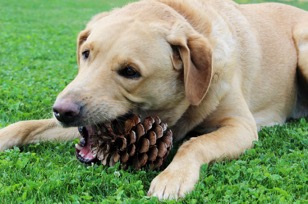
Connect with a verified veterinarian in minutes. Licensed vets are available 24/7 to answer your questions. No need to worry about your furry family member.
Does your dog enjoy batting pine cones around the yard? Does he ever chew on pinecones? Has your fur baby just swallowed a small pinecone? If so, then you’ve come to the right place!
This is a common problem for pet parents who live in areas that have pinecones. The cones are so interesting for dogs, and also make fun playthings! However, they could present a health issue for your dog.
Quick Facts About Pine Cones
Did you know that all conifer trees (also called pine trees) produce cones? These types of trees and their cones date all the way to prehistoric times, some going as far back as 300 million years. They’ve been around for a very long time! And scientists have even discovered that duck-billed dinosaurs found pinecones extremely delicious!
Conifer trees produce pine cones as a way to keep their seeds safe. In fact, the cones protect the seeds from cold temperatures and make it difficult for animals to eat the seeds. When the weather gets warm, the pine cones open up to release their seeds. And some pinecones even require a fire to open and release the seeds.
Pine Cones & Dogs
Many dogs enjoy playing with pinecones out in the yard or when on a walk. The cones can be fun to bat around and chase. They’ve also got an interesting texture that some dogs may find intriguing. In addition, some dogs are attracted to the terpene oils in the pine cones. Your dog may find the scent highly attractive and want to play with or eat the pine cone.
If dogs only play around and carry the cones, then there’s not much to worry about. On the other hand, if dogs and puppies like to chew pine cones, this could be a problem.
Pine needles can also be dangerous if eaten in large amounts. They can cause gastrointestinal issues such as intestinal obstruction, tears, punctures, and more.
There are several issues that make chewing pine cones dangerous for dogs. These include:
- Fibers of the pine cone can break off and cause a choking hazard
- Eating a pine cone could also cause damage to the stomach lining
- Large pieces or whole pinecones can become lodged in the intestines, causing an intestinal blockage
- Pine sap and needles carry substances that can cause allergic reactions in some dogs (uncommon)
- Pinecones may be covered with fertilizers or pesticides, which are toxic to dogs (uncommon)

Review symptoms, medications & behavior to keep your pets healthy with a Vet Online in just minutes.
Ask a Vet Live NowSymptoms of Pine Cone Poisoning in Dogs
Your canine companion may exhibit these symptoms if he’s eaten a pinecone:
- Vomiting
- Diarrhea
- Nausea
- Lethargy
- Loss of appetite
- Inflammation of the throat
- Drooling
- Excessive thirst or urination
What to Do If Your Dog Eats a Pine Cone?
If your dog has eaten a pine cone, it’s important to observe him and see if he shows any concerning symptoms or he starts acting different in some way.
If you see any symptoms in your dog or you’re worried that he’s eaten a pine cone, it’s best to call the vet right away.
Anaphylactic Reaction
Though rare, it is possible that some dogs could develop an anaphylactic reaction after eating a pine cone. This is a life-threatening condition.
In cases of a rare allergic reaction, your dog may show these symptoms:
- Difficulty breathing
- Throat swelling
- Coughing
- Trouble walking
If your fur baby is showing any of these signs and symptoms, then please call the vet immediately. These are signs of a life-threatening medical emergency. Your dog needs a vet appointment as soon as possible—fast treatment could save his life.
When a dog swallows a small bit of pinecone, chances are he will be just fine. Just watch for any signs that he’s not feeling good, and call the vet if you are worried.
It’s best to not let your dog or puppy play with pinecones or pine needles, just to be on the safe side! Instead, clean up the pinecones and give your fur baby some toys meant for dogs!
What are the Risks of Eating a Pine Cone?
The and American Society For The Prevention Of Cruelty To Animals recommend that dog keep their animals away from pine cones. If swallowed whole they could cause a blockage in your dog’s digestive system and if chewed up then the sharp pieces can also cause issues. Pet owners should do their best to ensure that non-food items are not in their dog’s mouth, specifically one with potentially sharp points or splinters like a chewed up pine cone.
Are Pine Cones Toxic For Dogs?
The toxicity of Christmas trees is more well known than pine cones. Teach your dog to leave it, as pine oil is a mild toxin to dogs in the concentration found in a tree, causing symptoms such as digestive upset and agitation. Physical blockages or damage to the digestive system is more likely than toxicity when it comes to pine cones. Eating anything else but dog food is not recommended. Always contact your vet if you have any concerns about your dog.
Stop Your Dog from Eating Pine Cones
If your dog loves to eat pine cones, it can be a challenge to get him to stop eating them! However, there are some things you can do to keep most pine cones out of your dog’s reach.
Use the leash: when out walking to restrict your dog’s movements around pine cones. Use the leash to keep him from going near pine cones and head him in a different direction to get him focused on having a fun walk.
Keep the yard clean: if you have plenty of pine cones in your yard, it’s a good idea to keep them cleaned up. This can be a challenge; however, picking them up regularly ensures your dog won’t have a chance to eat them.
Put up a fence: it may not be feasible to clean your entire yard of pine cones, so you may want to consider putting up a fence. Fence off a large enough area for your dog to run and play in. Keep this area free of pine cones rather than trying to clean your entire yard.
Connect with a verified veterinarian in minutes. Licensed vets are available 24/7 to answer your questions. No need to worry about your furry family member.

Rebecca MacMillan, BVetMed BSAVA PGCertSAM MRCVS
This article has been reviewed and approved by an independent Veterinarian: Rebecca is a companion animal vet who has always had a passion for writing and client communication. Since her graduation from the Royal Veterinary college in 2009 she has gained a wealth of experience in first opinion small animal practice, in both clinical and managerial roles. She currently works in the South West and deals with a variety of routine and emergency appointments, but particularly enjoys medicine cases. Outside of work and writing, she enjoys spending time with her family, including her bouncy flat coated retriever George!
Review symptoms, medications & behavior to keep your pets healthy with a Vet Online in just minutes.
Ask a Vet Live Now





